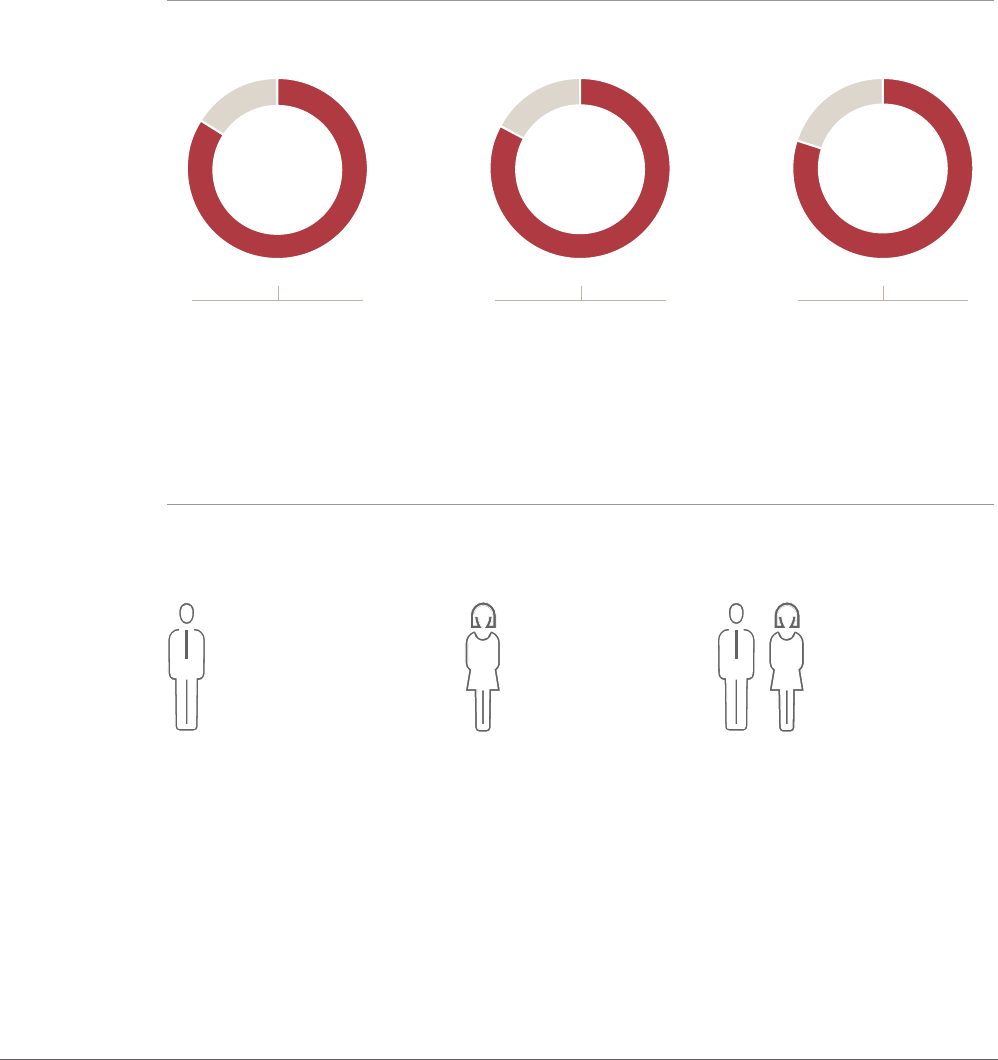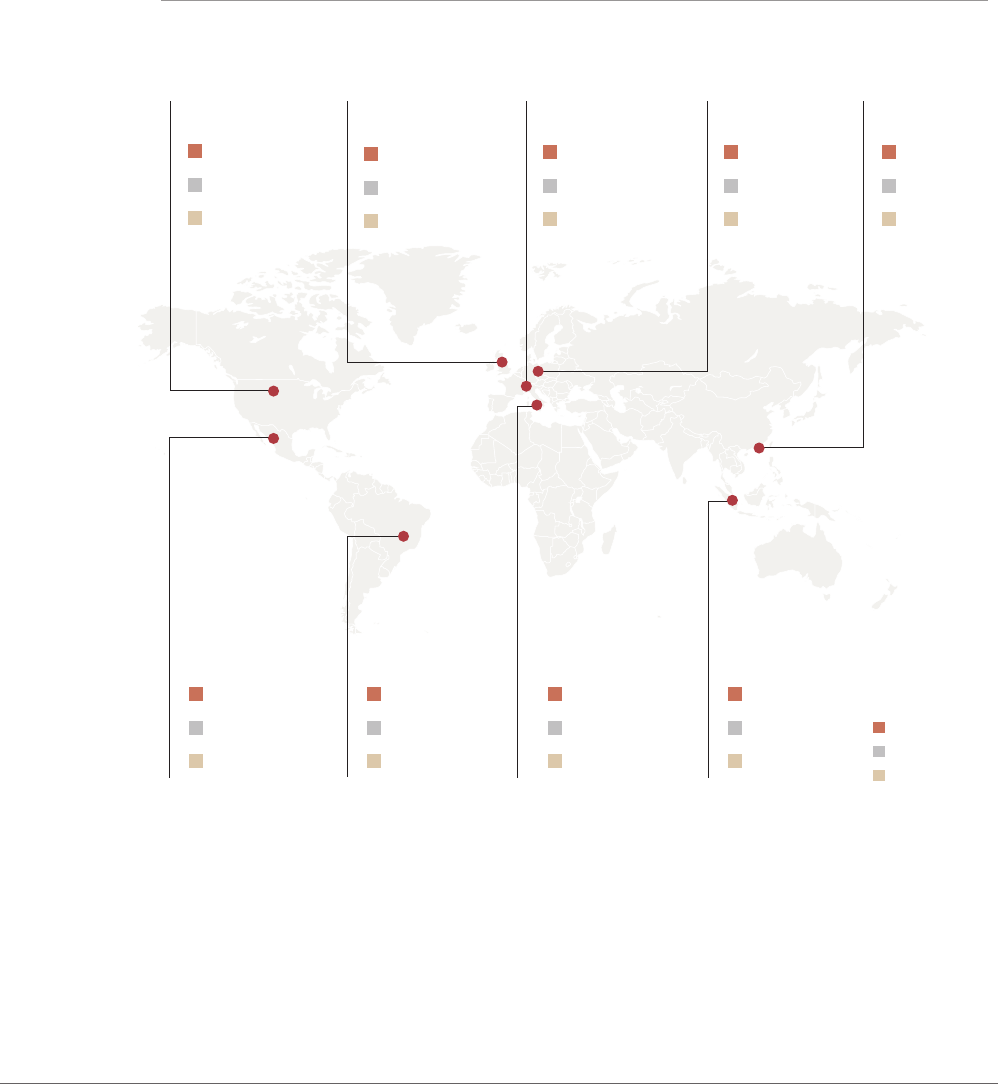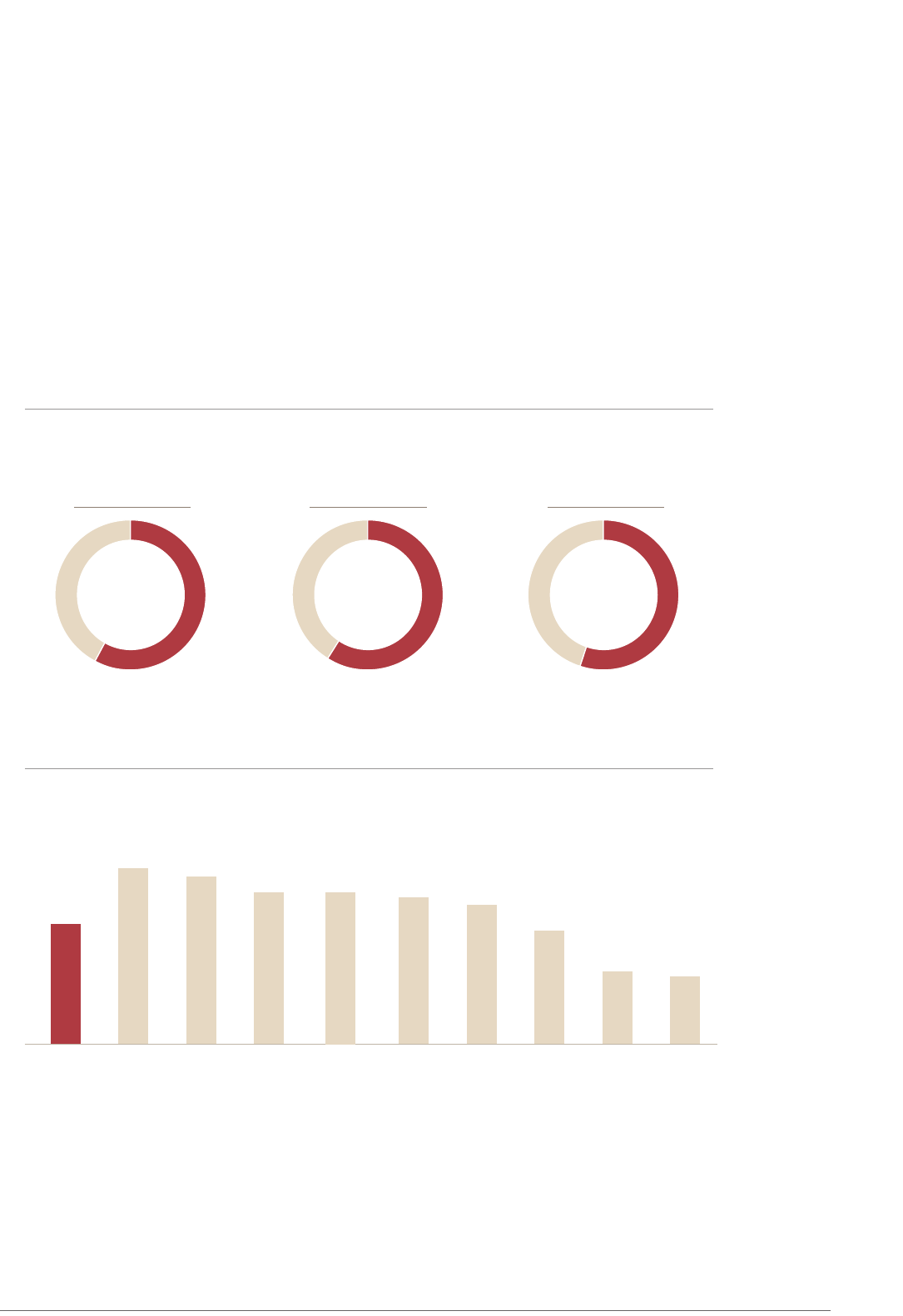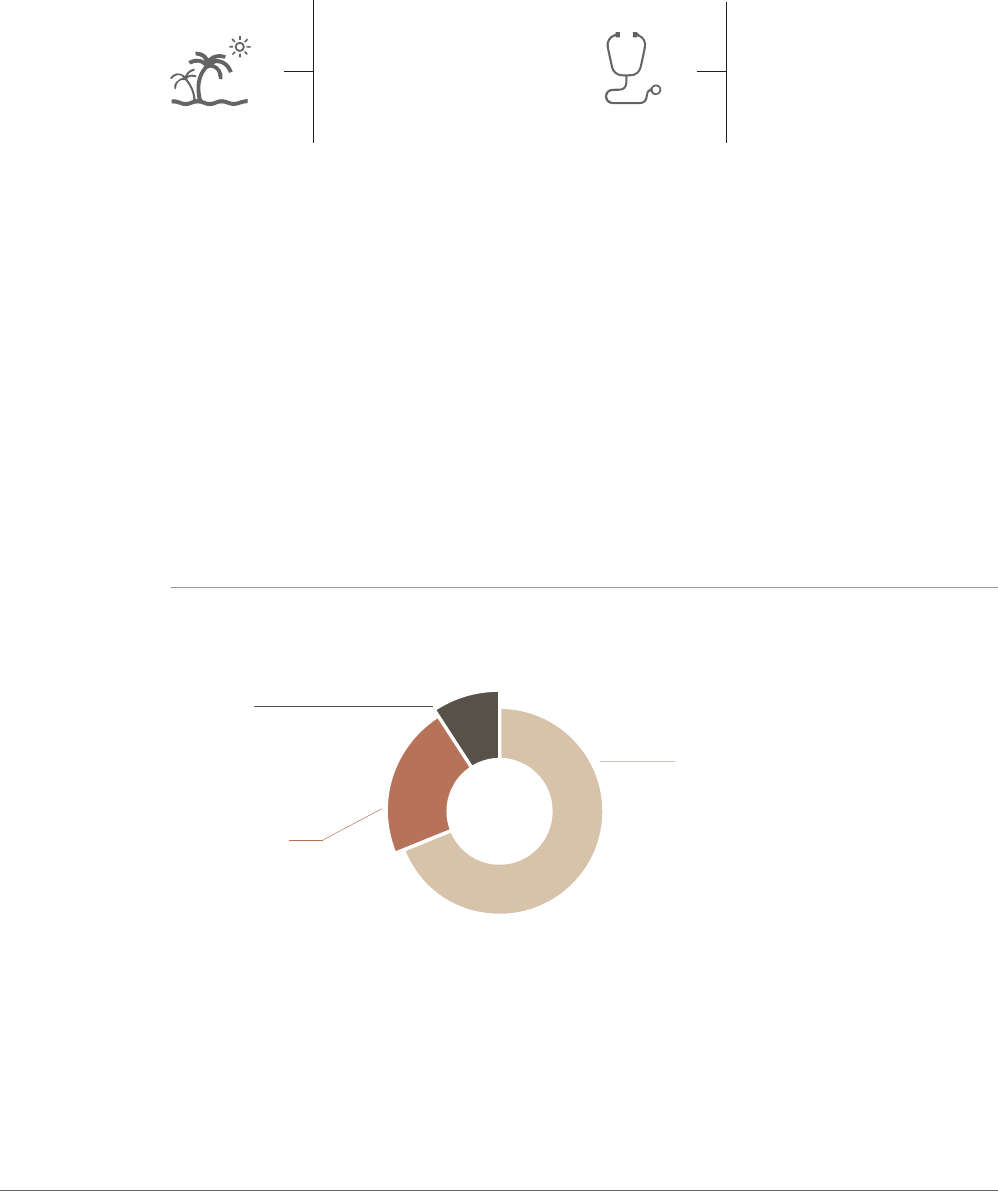
UBS Investor Watch
Switzerland insights: What’s on investors’ minds / 2019 Volume 1
Own your
worth
Why women should take
control of their wealth
to achieve nancial well-being

UBS Investor Watch2 of 16
For our latest UBS Investor Watch, we conducted
extensive research to study how women around
the world engage with their nances. We
surveyed nearly 3,700 married women, widows
and divorcees in Brazil, Germany, Hong Kong,
Italy, Mexico, Singapore, Switzerland, the UK
and the US.
We wanted to know: How do women around
the world approach their nancial well-being?
Are they fully engaged in the nancial decisions
that aect them? And if not, why not?

3 of 16
The answers are surprising.
Conventional wisdom oen says that women don’t
participate much in their nancial well-being, letting
their spouses take the lead instead. That wisdom is only
partly true. In fact, more than 80% of women globally
are highly involved in their short-term nances, such as
daily expenses, budgeting and cash ow.
Surprisingly, however, almost 60% of women do not
engage in the most important aspects of their nancial
well-being: investing, insurance, retirement and other
long-term planning.
Why do so many women focus on the present but ignore
the future?
The reasons dier, oen dramatically, across markets.
For example, women in the US and Singapore opt out of
long-term nancial decisions because they believe their
spouses know more. Women in Italy and Brazil say they
have more urgent responsibilities. Women in Switzerland
and Germany say their spouses never encouraged their
involvement.
Regardless of the rationale, failing to plan for the future
carries risk. As women around the world live longer, the
likelihood of becoming widowed or divorced increases.
Inevitably, women who plan for these possibilities will
be better prepared.
But women don’t need to do it alone.
In fact, women who approach long-term decisions in
partnership with their spouses report soaring levels
of satisfaction. Nearly all have high condence in the
future, feel less anxious about money and make fewer
nancial mistakes.
By sharing decisions jointly, both women and men can
face the future with optimism—and set an example of
nancial partnership for generations to come.

UBS Investor Watch4 of 16
1
Increasing lifespans bring women’s long-term
nancial needs to the forefront...
Women are expecting a long future, as lifespans continue to increase in the majority of the
world, and experts predict that women in several countries will likely live into their nineties on
average. In fact, 68% of women believe they will outlive their spouse.
With this in mind, women place particular importance on their long-term nancial needs. For
example, three-quarters (76%) say retirement planning is a top concern. Seven in 10 say long-
term care and insurance planning are highly important as well.
Women’s top long-term nancial needs
Percentage of women who cite each as highly important
retirement
planning
long-term care
planning
76%
72%
Women are aware of their increasing longevity
believe they will outlive
their spouse
68%
Insurance
68%
I’m really concerned with the rising costs
of healthcare and whether I can aord
my current lifestyle aer retirement.
“
“
I know that at some point in time I will
have to manage my nances alone and
I am denitely concerned about it.
“
– Switzerland, Female, 50 – Singapore, Female, 43
“

5 of 16
...but many women focus disproportionately on
short-term nancial needs
Though women are aware of their increasing longevity and the nancial needs associated with it,
most tend to focus their eorts on short-term nancial responsibilities. Eight in 10 women, for
example, are highly involved in managing the household’s day-to-day expenses and paying the
bills.
In contrast, only 23% of women take charge of long-term nancial decisions, such as investing,
nancial planning and insurance—which can have far more impact on their future than balancing
a checkbook. Only 19% of women share long-term nancial decisions with their spouses. Instead,
the majority of women (58%) defer to their husbands.
...but many opt out of long-term nances
Role in long-term investment and nancial planning decisions
Most women are highly involved in short-term nances...
Women who are equally or more involved than their spouses
manage day-to-day
expenses
85%
participate in large
purchase decisions
83%
pay bills
80%
58%
“My spouse
takes the lead.”
23%
“I take
the lead.”
19%
“We share
decisions equally.”
– UK, Female, 48
– Singapore, Female, 48
Leading the household, paying the bills and
all other day-to-day expenses fall under me,
whereas investing is under him.
“
“
I am responsible for paying all the bills,
shopping and handling bank accounts while
my spouse is responsible for major things
like investing in the stock market.
“
“

UBS Investor Watch6 of 16
2
Many women defer long-term nancial decisions
to spouses...
Though most women defer to their spouses on long-term nancial decisions, there are signicant
dierences across markets. For example, women in Singapore, Hong Kong and Switzerland are
the most likely to defer. Women in the UK and Germany also defer, though to a lesser degree.
Just over half of women in Italy (52%) and the US (54%) defer.
Notably, women in Mexico and Brazil are the least likely to defer to their spouses. More than half
of these women either make long-term nancial decisions jointly or take the lead themselves, the
highest among all the markets surveyed.
How women defer nancial decisions around the world
US
54%
21%
25%
UK
62%
22%
15%
Switzerland
69%
22%
9%
Germany
60%
21%
20%
Hong Kong
71%
20%
9%
Mexico
39%
30%
32%
Brazil
45%
33%
22%
Italy
52%
19%
29%
Singapore
72%
20%
8%
Spouse lead
Women lead
Shared
My spouse takes the lead on investment
decisions as he has more knowledge
and experience.
“
– Hong Kong, Female, 42
“
I was good with managing my money
and not spending more than I had, but
I wasn’t inclined to want to learn about
investing. I just sort of repelled from it.
“
– US, Female, 65
“
Figures may not add to 100% due to rounding.

7 of 16
...because they believe men know more about
investing and planning
Women who defer to their spouses have many reasons for doing so, such as more
urgent responsibilities, a lack of interest in long-term nances and even discouragement
from their spouses.
However, the main reason has to do with women’s assumptions about who knows
more. A full 82% of women think their spouses know more about long-term nances,
citing this belief as their top reason for deferring.
Reasons why women abdicate long-term investing decisions
Percentage of women who cite the following as reasons they defer to their spouse
“I think my spouse knows more
about this topic than I do.”
82%
“We take a divide-and-conquer approach;
I focus on other responsibilities.”
79%
“My spouse is the primary
breadwinner in the family.”
78%
“I’m not interested in
planning and investing.”
68%
“My spouse had more assets than
I did when we got married.”
67%
“Truth be told, I feel like
it’s my spouse’s money.”
64%
“My spouse never encouraged or
invited me to be more involved.”
58%
“My spouse discouraged me
from being more involved.”
56%
I want to be more involved in making the
investment decisions so I can learn, but
my partner thinks I’m not that capable.
“
– Italy, Female, 44
“
From the day I married him, he was the one
who always managed the nances, so I think
it’s a matter of experience. He’s gained all
the knowledge with regard to investments.
“
– Mexico, Female, 52
“

UBS Investor Watch8 of 16
3
Across markets, women reveal stark dierences in
why they defer to spouses
When comparing markets, it is clear that women have dierent reasons for deferring to their
husbands. For example, Brazilian women are most likely to defer because they believe their
husbands have more nancial knowledge, compared to 57% of German women who feel the
same. Women in Italy and Singapore are likely to say they have more pressing responsibilities,
while Swiss women are most likely to say their spouse never encouraged them to be involved.
Reasons women defer, by market
Percentage of women who defer to their spouses agree
“My spouse never encouraged
or invited me to be involved.”
64%
74%
74%
49%
37%
66%
81%
59%
22%
Brazil
Italy
Germany
Hong Kong
Mexico
Singapore
Switzerland
UK
US
“It’s a divide-and-conquer
approach. I have other
responsibilities to take care of.”
86%
87%
79%
80%
70%
86%
81%
75%
69%
Brazil
Italy
Germany
Hong Kong
Mexico
Singapore
Switzerland
UK
US
“I think my spouse knows more
about this topic than I do.”
93%
78%
57%
79%
83%
90%
81%
85%
88%
Brazil
Italy
Germany
Hong Kong
Mexico
Singapore
Switzerland
UK
US
“
– Hong Kong, Female, 42
The nancial world feels like a mystery
and I don’t feel like I have a good handle
on it. I always wanted someone else
to do it so I wouldn’t have to.
“
– US, Female, 65
“
My husband is the primary breadwinner
in my family, so he takes care of the
major nancial responsibilities.
“

9 of 16
Women who participate with spouses equally enjoy
the benets of shared decisions
Women who participate in long-term nancial decisions with their spouses not only increase
their chances of nancial security, but they feel more positive about the future.
For example, nine in 10 women who make joint decisions feel less anxious and more condent
about their nancial security. Nearly all feel more prepared to manage their nances if
something happens to their spouse.
The benets of shared decisions
Percentage of women who share in long-term nancial decisions agree
95%
“ If something
happens to my
spouse, I will
already know
all about our
nances.”
94%
“ I’m more
condent
about our
nancial
future.”
93%
“ We make
fewer
mistakes with
both of us
involved.”
91%
“ I am less
stressed about
our nances.”
“
– Brazil, Female, 55
Equally participating in the investment
decisions helps us to maintain transparency.
It also reduces the chance of making any
wrong decisions related to such crucial
matters of investment.
“
– Mexico, Female, 50
“
Sharing the responsibilities really
distributes the nancial pressure
and we make equal contributions
to our living standards.
“

UBS Investor Watch10 of 16
4
Many women learn the costs of deferring when
marriages end
Few women realize the consequences of deferring until aer a divorce or the death of a spouse.
Some widows and divorcees were disappointed to discover hidden debt and inadequate savings
that compromised their lifestyle.
With the wisdom of hindsight, 76% of widows and divorcees wish they had been more involved
in long-term nancial decisions while they were married. Nearly eight in 10 (77%) urge other
women to take a more active role. Women in Mexico and the US feel most strongly about
encouraging women to take action.
Widows and divorcees advise greater nancial engagement
discover negative
nancial surprises
74%
encourage other
women to take a
more active role
in their nances
77%
wish they had been
more involved in
long-term nancial
decisions
76%
Call to action
Widows and divorcees who urge greater involvement, by market
84%
Brazil
62%
Switzerland
88%
Italy
61%
Hong Kong
81%
UK
57%
Singapore
99%
Mexico
98%
US
64%
Germany
77%
Overall
Most of the time I took no interest
in nancial decisions, which is why
we were not equipped for this awful
situation.
“
– Germany, Female, widow
“
My regret is that I didn’t learn as much
as I should have during my marriage.
I was too preoccupied with my work,
the house and the children.
“
– UK, Female, divorcee
“

11 of 16
Younger women are perpetuating the status quo
In a counterintuitive twist, younger women are even more willing than older women to leave
investing and nancial planning decisions to their spouses. Nearly 60% of women under 50
defer to their spouses, compared to 55% of women over age 50.
Younger women are most likely to say they have more urgent responsibilities than investing
and nancial planning. They are also most likely to believe their spouses know more about
long-term nances than they do. Rates of deferral among young women are highest in
Singapore and lowest in Brazil.
Younger women defer at higher rates
Women who defer to spouses, by age group
59%
20–34
59%
35–50
55%
51+
Rates of deferral among younger women
Women age 20–34 who defer, by market
59%
73%
69%
65%
63%
61%
56%
41%
40%
Overall
Singapore
UK
Hong Kong
Germany
Switzerland
US
Mexico
Brazil
Italy
65%
Generation spotlight
With my husband taking the lead on
investment decisions, it allows me to
concentrate on my children more.
“
– Germany, Female, 41
I’m exhausted with running around with
the toddler and have fears about my own
lack of investing knowledge.
“
– US, Female, 38
““

UBS Investor Watch12 of 16
5
Increasing lifespans bring long-term nancial needs
to the forefront…
With increasing life expectancy come new nancial challenges to consider, particularly regarding
retirement. At present, 76% of Swiss women rate retirement planning as their most important
long-term nancial need, while 75% rate long-term care planning as the most pressing issue.
However, although women are aware of these challenges, many are happier focusing on short-
term nancial responsibilities, such as handling day-to-day expenses (87%) and paying bills
(83%). 69% of Swiss women still say they opt out of long-term nancial decisions.
One key reason for this deferral is a perceived lack of knowledge. More than two thirds (68%)
of married women think that a high level of knowledge is needed in order to make good
investment decisions and 81% believe that their spouse knows more about it.
Nevertheless, most women (88%) would feel more condent about their nancial future if they
were equally involved in making long-term nancial decisions and 91% believe they would make
fewer mistakes with both of them involved.
Many women opt out of long-term nances...
Roles in long-term investment and nancial planning decisions
76%
see retirement
planning as their most
important long-term
nancial need
75%
believe long-term
care planning is
the most pressing
issue
69%
22%
9%
Spouse takes
the lead
Woman takes
the lead
Decisions
equally shared

13 of 16
My role in the nancial decision making
is not that big. It’s my spouse who takes
the nancial decisions and manages the
nance aspect of our lives.
“
– Switzerland, Female, 58
“
I’m concerned about retirement. I
feel that saving for good health care
options is an important matter.
“
– Switzerland, Female, 50
“
… because they believe a high level of knowledge is needed
Percentage of women who agree
…althoug the benets of shared nancial decisions are numerous
Percentage of women who agree on the important benets of being equally involved in long-
term nancial decisions
Switzerland spotlight
believe a high level of knowledge is
needed to make good investment decisions
68%
believe their spouse knows more about
long-term investing decisions
81%
88%
feel more
condent about
their nancial
future
91%
believe they will
make fewer
nancial mistakes
with both of us
involved

UBS Investor Watch14 of 16
…and many women learn the costs of deferring
when marriages end
In the event of a divorce or the death of their spouse, 91% of Swiss women were confronted
with nancial surprises. In light of this, 70% of widows and divorcees wish they had been
more involved in long-term nancial decisions and 62% would encourage other women to
take an active role in their nances.
Taking steps to educate themselves about nances (59%), insisting on full transparency of
all accounts (55%) and talking more about nances with their spouse (54%) is some of the
advice these women would give to married women.
Women advocate for taking a more active role in nances
Percentage of widows and divorcees that recommend the following to married women
were confronted
with nancial
surprises upon their
divorce or the death
of their spouse
91%
encourage other
women to take an
active role in their
nances
62%
wish they had
been more
involved in
long-term
nancial decisions
70%
“Take steps to educate yourself about nances.”
“Insist on full transparency of all accounts.”
“Talk more about nances with your spouse.”
59%
55%
54%
Switzerland spotlight

15 of 16
Taking control
6
Our research revealed that many women delegate long-term nancial decisions – like
investments, pensions and insurance – to their spouses when they get married.
That’s risky. As life moves on, dierent circumstances and events can force women to take
control of their nances – when they’re least prepared to do so.
But it’s a dierent story for women who share decisions with their partners about long-term
nances. They feel condent about the future and their money today, because they’re better
prepared for whatever might happen tomorrow.
Own your worth
Understanding your nancial situation at every stage of your life is key to being prepared for all
of life’s challenges and opportunities. At UBS, we provide expertise and best-in-class nancial
solutions for every stage in our clients’ lives. Our aim is to be a reliable partner for our clients,
who need more than just a bank, by:
• Better serving women by providing tailored holistic advice along their lifecycle
• Delivering opportunities for women to connect and get more involved in nancial decisions
• Oering advice beyond investing and access to specialists around the world
Take the rst steps today to take charge of your nancial well-being and visit
ubs.com/womenswealth

This document has been prepared by UBS AG, its subsidiary or affiliate (“UBS”). This document and the information contained herein are
provided solely for information purposes. It is not to be regarded as investment research, a sales prospectus, an offer or solicitation of an offer to
enter in any investment activity. UBS makes no representation or warranty relating to any information herein which is derived from independent
sources.
UBS does not provide legal or tax advice and this document does not constitute such advice.
Approved and issued by UBS, this document may not be reproduced or copies circulated without prior written permission of UBS. Neither UBS
nor any of its directors, officers, employees or agents accepts any liability for any loss or damage arising out of the use of all or any part of this
document.
© UBS 2019. The key symbol and UBS are among the registered and unregistered trademarks of UBS. All rights reserved.
650830
Explore more insights at ubs.com/investorwatch-ch-en
About the survey: As women’s life expectancies increase and divorce rates remain high, more women may nd
themselves solely responsible for their own nances. UBS Global Wealth Management embarked on research to
gauge women’s level of and satisfaction with their nancial involvement. From September 2017 to January 2019, UBS
surveyed 3,652 women. Of these women, 2,251 were married with at least $1m in investable assets. Others (1,401)
were either divorced or widowed. These women had at least $250k in investable assets. UBS also conducted in-depth
interviews with 71 female respondents. The entire global sample was split across nine markets: Brazil, Germany, Hong
Kong, Mexico, Singapore, Switzerland, Italy, the UK and the US.
